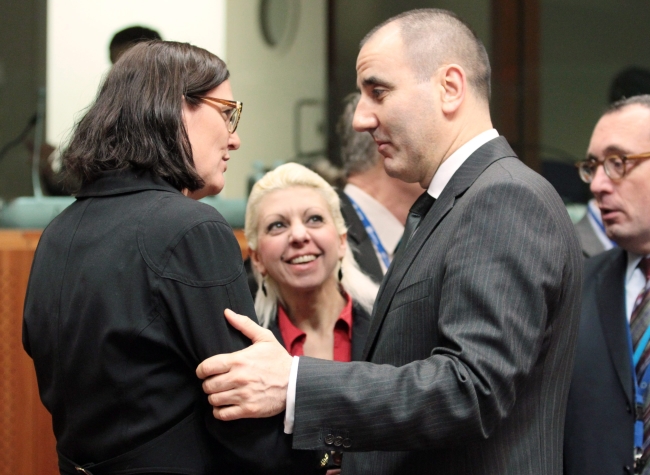Poland 'understands reservations' over Bulgaria and Romania border-free travel
PR dla Zagranicy
Peter Gentle
08.03.2013 12:30
An unnamed 'diplomatic source' has told a Polish newspaper that though accepting Bulgaria and Romania into the border-free Schengen Zone, Poland understands why some countries have reservations about the move.

Interior Minister of Bulgaria Tsvetan Tsvetanov (R) chats with European home affairs Commissioner Cecilia Malmstrom (L) at the start of a European Union interior and home affairs ministers council meeting at the European headquarters, in Brussels, Belgium, 07 March: photo - EPA/OLIVIER HOSLET
“We understand the importance for Romania and Bulgaria's accession to the Schengen Zone, because it gives a sense of full membership in the EU. On the other hand, it is difficult to disagree with some reservations expressed by some countries,” Polish diplomat has told the Rzeczpospolita daily.
A meeting of interior ministers from the EU's 27 member states in Brussels on Thursday discussed the two countries' application.
“The Council decided that the issue will again be addressed before the end of 2013,” Alan Shatter, Ireland's minister for justice, equality and defence, who chaired the meeting, is quoted by the European Voice as saying.
“There are a number of [member] states who had a variety of issues of concern,” he added.
Though the European Commission has found the two countries to be ready for Schengen membership at a technical level, some interior ministers expressed political concern over the move, with national welfare budgets under strain at a time of austerity.
German Interior Minister Hans-Peter Friedrich said that Bulgaria and Romania do not meet the criteria to join the 26-member, visa-free Schengen Zone.
“There are some areas of weakness, such as in the functionality of the judicial system, that prevents us from saying: abolish the borders,” he said.
In order for a country to join the Schengen zone, all 27 EU member states have to vote in favour of the membership application.
Citizens from Bulgaria and Romania, the EU's newest members, will be able to work in other member states as of 2014. (pg)